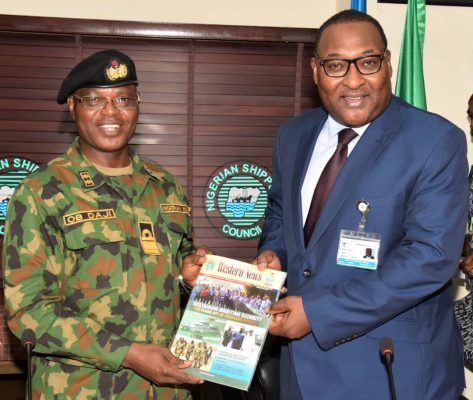The Nigerian Navy on Thursday said five vessels from high risk coronavirus countries have visited oil platforms in Nigeria in the last seven days.
Flag Officer Commanding, Western Naval Command, Rear Admiral Oladele Daji, who disclosed this when he visited the Executive Secretary, Nigerian Shippers’ Council, Hassan Bello, in Lagos, said the Navy had alerted the Nigerian Ports Authority (NPA) and the Ports Health officials to take more precautions to ensure that the virus is not imported into the country through such vessels.
He said, “The operational directive from the Chief of Naval Staff is being complied with 100 percent and that is to track the history of vessels calling at our ports up to 90 days and beyond and those that have called at ports that are deemed to be high risk places are noted and such information conveyed to the relevant agencies including Port health and the NPA to give special attention to such vessels.
“In the last one week, we have alerted the authorities of five vessels that have visited high risk areas before coming to Nigeria. Fortunately for us, most of them are offshore oil and gas based operations and did not have contact with our conventional ports.
“The Federal Government guidelines on ships calling at our ports is very clear. Every vessels visiting our ports must show evidence that they have been at sea for the last 14 days minimum and all other health checks are done to ensure they are free from the virus.”
Speaking on complaints of harassment and detention of port workers especially clearing agents by security operatives enforcing the lockdown policy in Lagos State, Daji assured that he would communicate with the Commander of NNS Beecroft, who he said is also a member of the Lagos State Security Council.
He recommended that in addition to identity cards, port pass should be given to people that have legitimate business to do at the ports.
The Naval Chief also advocated for the formation of a port community platform to bridge the gap between agencies of government in the maritime sector.
Speaking earlier, the NSC boss commended the Navy for providing advise and alerting ports authority on vessels that have visited coronavirus infected countries.
According to Bello, that is the first layer of protection for the country against importing the pandemic into the country through the seaport.
He said, “We know you are providing advise to the port authorities on vessels that made call in high risk areas and that is a layer of protection for us so that special attention will be given to such vessels. That is a priceless information and will help in the containment of the virus.”
Bello said there is the need to track cargoes coming into the country, the same way vessels are being tracked.
He added that there is need to pursue the port community system to integrate all stakeholders including the Navy to deepen collaboration and sharing of information among industry stakeholders.
“The port community system or the national single window is very important because it is a platform that we must speak in unison and in synergy. We need to aggregate efforts especially now and that is what (Nigerian) Shippers Council is pursuing.
“The most important thing is what we have learnt in this crisis. We can’t just lay back and say the crisis is gone and tomorrow it is business as usual. We have learnt that there must be collaboration and coming together of port community system that speaks to everyone, that is transparent, efficient and timely. While we wait for the national single window, I think we should pursue the port community system.
“And to pursue this, we are in tandem with the Nigerian Ports Authority. I know the Navy has it’s own integrated system which is a very sophisticated and we have requested that Shippers’ Council be integrated just as Customs has done. So the Navy must at all times support merchant shipping which is the historical duty of the Navy for a very long time.”
